Acne, a common skin condition that affects millions of people worldwide, can be a source of frustration and self-consciousness.
From blackheads and whiteheads to painful cysts and nodules, acne manifests in various forms and can impact individuals of all ages and skin types.
Fortunately, with the right approach and consistent skincare practices, it’s possible to effectively manage and treat acne.
In this comprehensive guide, we’ll explore the underlying causes of acne, common misconceptions, and evidence-based strategies for achieving clearer, healthier skin.
Understanding the Causes of Acne:
Before delving into treatment options, it’s crucial to understand the underlying causes of acne.
Acne occurs when hair follicles become clogged with oil, dead skin cells, and bacteria, leading to the formation of pimples, blackheads, and whiteheads.
Several factors contribute to the development of acne, including:
Excess Sebum Production:
Overproduction of oil (sebum) by the sebaceous glands can clog pores and promote bacterial growth.
Bacterial Overgrowth:
Propionibacterium acnes (P. acnes) bacteria thrive in the clogged pores of acne-prone skin, leading to inflammation and infection.
Hormonal Changes:
Fluctuations in hormone levels, particularly during puberty, menstruation, pregnancy, and menopause, can trigger or exacerbate acne.
Genetics:
A family history of acne may predispose individuals to develop the condition.
Lifestyle Factors:
Diet, stress, sleep patterns, and skincare habits can influence acne development and severity.
Dispelling Acne Myths and Misconceptions:
There are many misconceptions surrounding acne and its treatment, leading to confusion and frustration among individuals seeking clear skin. Some common myths include:
Myth: Acne is caused by poor hygiene.
While keeping the skin clean is essential, excessive scrubbing or washing can irritate the skin and worsen acne.
Myth: Only teenagers get acne.
Acne can occur at any age, from adolescence to adulthood, and may persist into the 30s, 40s, and beyond.
Myth: Sun exposure clears acne.
While sun exposure may temporarily improve acne symptoms by drying out the skin, it can lead to long-term damage and worsen inflammation.
Myth: Popping pimples helps them heal faster.
Picking or squeezing pimples can increase inflammation, spread bacteria, and lead to scarring.
Effective Treatment Strategies for Acne:
Treating acne requires a multifaceted approach that addresses its underlying causes and targets specific symptoms.
Here are some evidence-based treatment strategies to consider:
Topical Treatments:
Over-the-counter and prescription-strength topical treatments containing ingredients like benzoyl peroxide, salicylic acid, retinoids, and azelaic acid can help unclog pores, reduce inflammation, and prevent new breakouts.
Oral Medications:
In cases of moderate to severe acne, oral medications such as antibiotics, hormonal contraceptives, and isotretinoin (Accutane) may be prescribed to control bacterial growth, regulate hormone levels, and reduce oil production.
Professional Procedures:
Dermatological procedures such as chemical peels, microdermabrasion, laser therapy, and corticosteroid injections can help improve acne symptoms, reduce scarring, and promote skin renewal.
Lifestyle Modifications:
Adopting healthy lifestyle habits, including a balanced diet, regular exercise, stress management techniques, and proper skincare practices, can complement acne treatment and promote overall skin health.
Creating a Personalized Skincare Routine:
Building a personalized skincare routine is essential for managing acne and promoting clear, healthy skin.
Here’s a step-by-step guide to creating an effective regimen:
Cleanse:
Wash your face twice daily with a gentle, non-comedogenic cleanser to remove dirt, oil, and impurities without stripping the skin’s natural moisture barrier.
Treat:
Apply topical treatments containing acne-fighting ingredients such as benzoyl peroxide, salicylic acid, or retinoids to target existing breakouts and prevent new ones from forming.
Moisturize:
Hydrate the skin with a lightweight, oil-free moisturizer to maintain moisture balance and prevent dryness and irritation.
Protect:
Apply a broad-spectrum sunscreen with SPF 30 or higher daily to protect your skin from UV damage and prevent post-inflammatory hyperpigmentation.
Patience and Persistence:
Achieving clear skin takes time, patience, and consistency.
It’s essential to give acne treatments an adequate trial period to assess their effectiveness and make adjustments as needed.
Be patient with your skin and resist the urge to try quick-fix solutions that may worsen acne or cause additional complications.
Conclusion:
Acne can be a challenging and persistent skin condition, but with the right approach and treatment strategies, clearer, healthier skin is achievable.
By understanding the underlying causes of acne, dispelling myths and misconceptions, and implementing evidence-based treatment options, individuals can effectively manage breakouts, reduce inflammation, and improve overall skin health.
Remember to create a personalized skincare routine, be patient and persistent, and consult a dermatologist for professional guidance and treatment recommendations.
With dedication and the right resources, you can unlock the path to clearer, blemish-free skin and regain your confidence and self-esteem.
